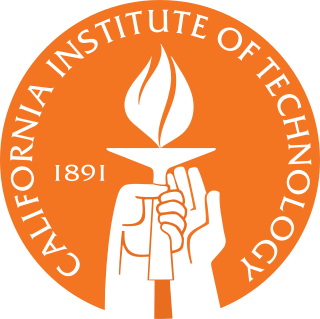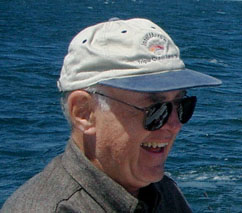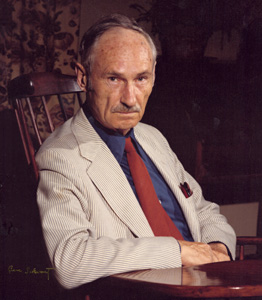
The California Institute of Technology (Caltech) is a private research university in Pasadena, California. The university is known for its strength in science and engineering, and is among a small group of institutes of technology in the United States which is primarily devoted to the instruction of pure and applied sciences. Caltech is ranked among the best academic institutions in the world and is among the most selective in the U.S.

Bryn Mawr is a census-designated place (CDP), located across three townships: Radnor Township and Haverford Township, Delaware County, and Lower Merion Township, Montgomery County, Pennsylvania, just west of Philadelphia along Lancaster Avenue (US-30).

Gordon Earle Moore is an American businessman, engineer, and the co-founder and chairman emeritus of Intel Corporation. He is also the author of Moore's law.

Bryn Mawr College is a women's liberal arts college in Bryn Mawr, Pennsylvania. Founded as a Quaker institution in 1885, Bryn Mawr is one of the Seven Sister colleges, a group of elite, historically women's colleges in the United States, and the Tri-College Consortium along with Haverford College and Swarthmore College. The college has an enrollment of about 1,350 undergraduate students and 450 graduate students. It was the first women's college to offer graduate education through a PhD.
The Seven Sisters is a term that refers to seven highly selective liberal arts colleges in the Northeastern United States that are historically women's colleges. They were created to provide women with the educational equivalent to the Ivy League colleges. The name Seven Sisters is a reference to the Greek myth of The Pleiades, the seven daughters of the Titan Atlas and the sea-nymph Pleione. The daughters were collectively referred to as The Seven Sisters.

Richmond Alexander Lattimore was an American poet and classicist known for his translations of the Greek classics, especially his versions of the Iliad and Odyssey.

Thomas Eugene Everhart FREng is an American educator and physicist. His area of expertise is the physics of electron beams. Together with Richard F. M. Thornley he designed the Everhart–Thornley detector. These detectors are still in use in scanning electron microscopes, even though the first such detector was made available as early as 1956.

Eli Broad was an American businessman and philanthropist. In June 2019, Forbes ranked him as the 233rd-wealthiest person in the world and the 78th-wealthiest in the United States, with an estimated net worth of $6.7 billion. He was known for his philanthropic commitment to public K–12 education, scientific and medical research, and the visual and performing arts.
Lilly Endowment Inc., headquartered in Indianapolis, Indiana, is one of the world's largest private philanthropic foundations and among the largest endowments in the United States. It was founded in 1937 by Josiah K. Lilly Sr. and his sons, Eli Jr. and Josiah Jr. (Joe), with an initial gift of Eli Lilly and Company stock valued at $280,000 USD. As of 2014, its total assets are worth $9.96 billion.
Nancy J. Vickers is an American educator and college administrator. She was the seventh president of Bryn Mawr College in Bryn Mawr, Pennsylvania (1997–2008).
Sherman Mills Fairchild was an American businessman and investor. He founded over 70 companies, including Fairchild Aircraft, Fairchild Industries, and Fairchild Camera and Instrument. Fairchild made significant contributions to the aviation industry and was inducted into the National Aviation Hall of Fame in 1979. His Fairchild Camera & Instrument Corporation, Semiconductor Division company played a defining role in the development of Silicon Valley. He held over 30 patents for products ranging from the silicon semiconductor to the 8-mm home sound motion-picture camera. Fairchild is also responsible for inventing the first synchronized camera shutter and flash as well as developing new technologies for aerial cameras that were later used on the Apollo Missions.
Machteld Johanna Mellink was an archaeologist who studied Near Eastern cultures and history.

Jack M. Barrack Hebrew Academy is a coeducational college-preparatory and religiously pluralistic Jewish day school for grades 6 through 12, located in Bryn Mawr, Pennsylvania.

Mary Elizabeth Garrett was an American suffragist and philanthropist. She was the youngest child and only daughter of John W. Garrett, a philanthropist and president of the Baltimore and Ohio Railroad. Well known for her "coercive philanthropy", Mary Garrett donated money to start the Johns Hopkins University Medical School in 1893 on the condition that the school would accept female students "on the same terms as men". She founded the Bryn Mawr School, a private college-preparatory school for girls in Baltimore, and generously donated to Bryn Mawr College of Pennsylvania with the requirement that her intimate friend Martha Carey Thomas be the president. Like many other suffragists of the nineteenth century, Garrett chose not to marry; instead, she kept a lifelong working and emotional relationship with Thomas. In her later years, she collaborated with her longtime friends Susan B. Anthony and Anna Howard Shaw to try to secure the right for women to vote in the United States.

Helene D. Gayle, is an American doctor who is the CEO of The Chicago Community Trust, one of the nation's leading community foundations. For over 100 years, The Chicago Community Trust has mobilized people, ideas, organizations and resources to advance equity, opportunity and prosperity for all.
Paul Donnelly Paganucci was a prominent American investment banker, university educator, college financial administrator and businessman.
Donald Harris was an American composer who taught music at Ohio State University for 22 years. He was Dean of the College of the Arts from 1988 to 1997.
In philanthropy, donor intent is the purpose, sometimes publicly expressed, for which a philanthropist intends a charitable gift or bequest. Donor intent is most often expressed in gift restrictions, terms, or agreements between a donor and donee, but it may also be expressed separately in the words, actions, beliefs, and giving practices of a philanthropist. Donor intent is protected in American law regarding charitable trusts, and trustees' primary fiduciary obligation is to carry out a donor's wishes.

Stephen James Blackwood is a scholar, cultural commentator, and social entrepreneur.

Dewilda Naramore Harris was an American historian, economist, foreign service officer, and philanthropist.











